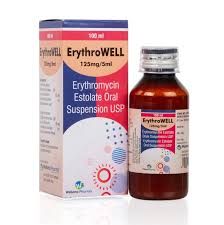Erythromycin Oral Suspension is an antibiotic used to treat a variety of bacterial infections. It belongs to the macrolide class of antibiotics and is effective against many Gram-positive bacteria and some Gram-negative bacteria.
Key Features
- Formulation: The syrup typically contains Erythromycin ethylsuccinate, which is a stable form of erythromycin suitable for oral administration.
- Volume: Each bottle contains 100ml of syrup, making it convenient for dosing.
Indications
Erythromycin is indicated for the treatment of:
- Respiratory Tract Infections: Such as pneumonia, bronchitis, and sinusitis.
- Skin and Soft Tissue Infections: Including cellulitis and impetigo.
- Gastrointestinal Infections: Effective against certain types of bacterial gastroenteritis.
- Dental Infections: Used for treating infections in oral/dental areas.
- Sexually Transmitted Diseases: Such as chlamydia and gonorrhea.
Mechanism of Action
Erythromycin works by inhibiting bacterial protein synthesis, effectively stopping the growth of bacteria. It binds to the 50S subunit of the bacterial ribosome, preventing the translation process necessary for bacterial reproduction.
Dosage and Administration
- Recommended Dosage: The dosage varies based on the type and severity of the infection:
- For adults, it is typically 250 mg to 500 mg every 6 hours, depending on the condition.
- For children, dosages are usually calculated based on body weight (e.g., 30 to 50 mg/kg/day in divided doses).
- Administration Instructions:
- Shake the bottle well before use.
- Measure the prescribed dose using a proper measuring device (oral syringe or measuring spoon).
- Erythromycin should ideally be taken on an empty stomach (1 hour before or 2 hours after meals) to enhance absorption.
Side Effects
Common side effects may include:
- Gastrointestinal disturbances such as nausea, vomiting, diarrhea, and abdominal pain.
- Allergic reactions, which can manifest as rash or itching.
Serious side effects are rare but can include:
- Liver dysfunction or jaundice.
- Severe allergic reactions (anaphylaxis).
- Hearing impairment with high doses or prolonged use.
If any severe reactions occur, discontinue use immediately and seek medical attention.
Precautions
- Contraindications: Erythromycin should not be used in individuals with a known allergy to erythromycin or other macrolide antibiotics.
- Caution in Special Populations: Use with caution in patients with liver disease or those taking medications that can interact with erythromycin (e.g., warfarin, digoxin).
- Pregnancy and Breastfeeding: Generally considered safe but consult a healthcare provider before use.



